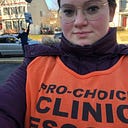The Urgent Need for Abortion Funding during COVID-19
As abortion care becomes harder to access, organizations like WRRAP fill a critical gap in funding for patients
Lately, you may have heard the phrase, “the coronavirus does not discriminate.” And while on a technical level this may be true, the coronavirus has laid bare the myriad of ways that healthcare systems and abortion access are deeply discriminatory. As the virus ramps up and we prepare for more waves of this virus to hit, the needs of pregnant people to access abortion care will increase exponentially, too.
Multiple abortion funds across the nation are reporting that callers have been asking for higher than normal grants to cover the costs of their procedures. They’ve lost income. And many are scheduling their appointments as soon as they can, instead of taking time to ask their personal networks to help cover their costs due to the reasonable fears that clinics may be closed in the next few weeks. And as more and more clinics across the country are deemed nonessential, patients will have to travel farther to access abortion care.
This is why organizations such as WRRAP — the Women’s Reproductive Rights Assistance Project — are crucial to maintaining access to abortion. WRRAP operates on the national level and helps pregnant people from all 50 states pay for their procedures. Due to WRRAP’s unique high-efficiency and all-volunteer model, they are able to ensure that 90% of all the funds that are donated directly fund abortion care and access to emergency contraception.

In a statement emailed to me, Executive Director Sylvia Ghazarian said:

“WRRAP is the only independent abortion fund that provides urgently needed financial assistance, on a national level, to those seeking abortion or emergency contraception. Because the surge of anti-abortion legislation has triggered insurmountable financial barriers for thousands of individuals needing these medical services, WRRAP’s work is more critical than ever.
WRRAP works with each patient to identify their specific needs and sends the necessary funds directly to their preferred WRRAP-affiliated clinic. These 700 clinics and doctors are top-of-the-line providers that include members of Planned Parenthood, the National Abortion Federation, and independent providers. And these women are students, part-time workers, victims of domestic abuse, mothers, in committed relationships, homeless, single, and more. No one is turned away from funding due to their personal circumstances.
One unique aspect of WRRAP’s work is its national presence. Access to abortion care can vary drastically by state, county, and even zip code. Many local abortion funds will only provide assistance to patients in their home states. For some pregnant people, it may be easier for them to cross state borders to receive care than travel hours across their own state. This is especially true for places like Kentucky, Mississippi, and Alabama that only have one abortion-providing clinic in the state. Due to increased travel, longer-term childcare, and expenses due to missed work, a national fund for abortion becomes even more critical. Much of WRRAP’s funding goes to patients that live in hostile states.
In 2019 alone, WRRAP provided almost half a million dollars — $462,889 — to 2,217 patients. The average size of those grants was $209. Abortions can average anywhere from $300-$12,000.
As one patient said in a testimonial,
“I am a single mother of 4 children all under 10 years of age. I cannot take on more right now with having the added pressure of life in general without working. I’m thankful for programs like WRRAP because it took a weight off my shoulders of how can I get the money without making a bad decision and also knowing I am not alone. Feeling hopeless and pregnant doesn’t do anyone any good emotionally. WRRAP gave me peace of mind and the help I needed. Thanks!”
To donate to WRRAP and help ensure that folks across the country can access the care they need during this pandemic, please visit wrrap.org/donate.
